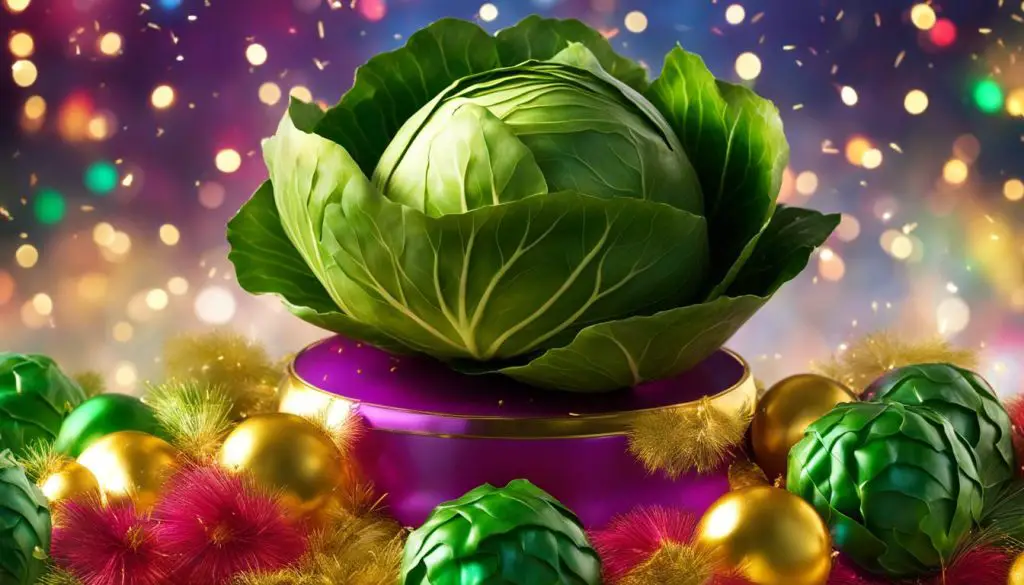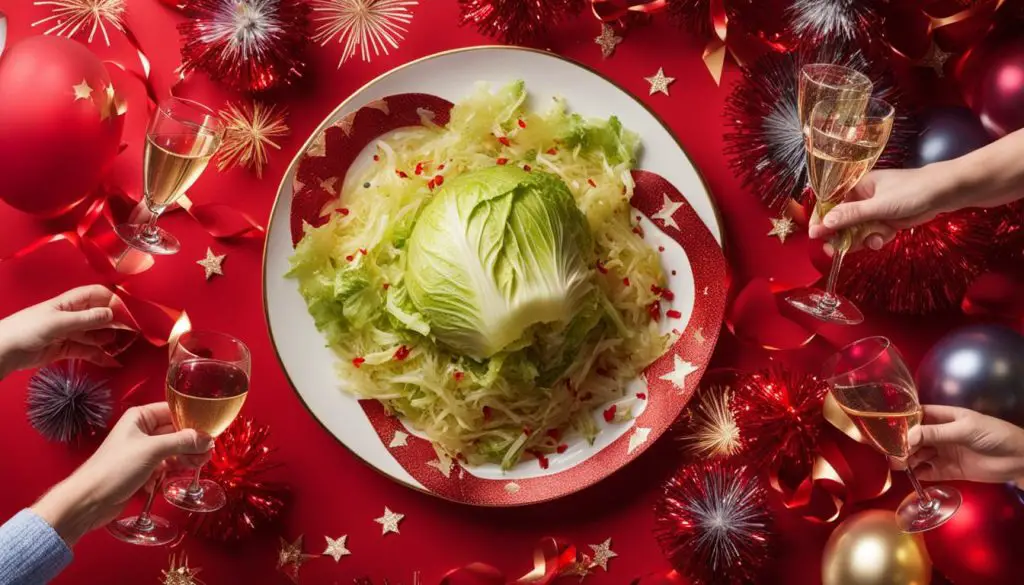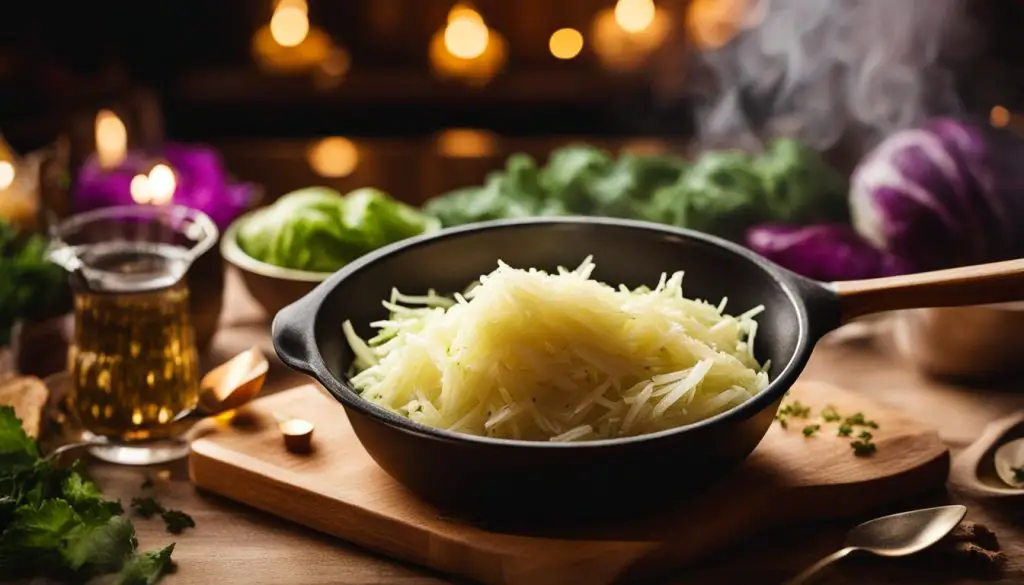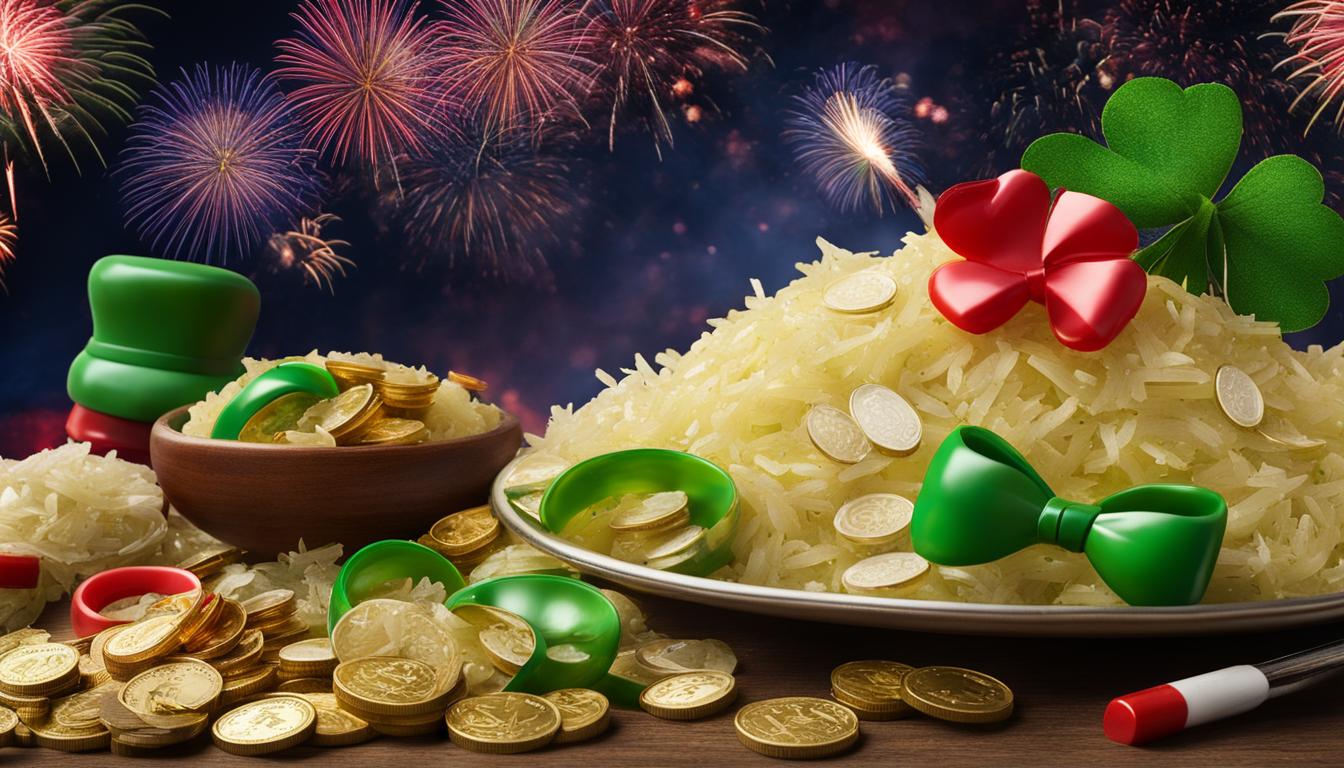As the New Year approaches, you may have heard about a peculiar tradition – eating sauerkraut for good luck. But is there any truth behind this age-old belief? Let’s delve into the fascinating world of sauerkraut and its association with New Year’s celebrations.
Contents
- 1 The Tradition of Eating Sauerkraut on New Year’s: Origins, Variations, and Beliefs
- 2 Cabbage and Good Luck: Myth or Fact?
- 3 Symbolic Meanings of Cabbage in Different Cultures
- 4 Connection between Cabbage and Other New Year’s Traditions
- 5 The Power of Belief and Positive Thinking in New Year’s Traditions
- 6 Conclusion
- 7 FAQ
- 7.1 Is there any scientific evidence to support the belief that eating sauerkraut on New Year’s brings good luck?
- 7.2 What is the significance of eating sauerkraut on New Year’s?
- 7.3 Are there variations in how sauerkraut is prepared and consumed on New Year’s?
- 7.4 What symbolic meanings are associated with cabbage in different cultures?
- 7.5 Is cabbage served alongside other foods in New Year’s traditions?
- 7.6 What is the power of belief and positive thinking in New Year’s traditions?
- 7.7 Is sauerkraut a superstition or a meaningful tradition?
- 8 Source Links
Key Takeaways:
- Sauerkraut has been linked to bringing wealth and success in the year ahead.
- Various cultures have their own variations and beliefs surrounding the tradition of eating sauerkraut on New Year’s.
- While there is no scientific evidence supporting its good luck properties, the power of belief shouldn’t be underestimated.
- Cabbage holds symbolic meanings in different cultures, adding to the allure of sauerkraut as a New Year’s tradition.
- Pairing sauerkraut with other traditional foods further enhances its significance in New Year’s celebrations.
The Tradition of Eating Sauerkraut on New Year’s: Origins, Variations, and Beliefs
The tradition of eating sauerkraut on New Year’s has been practiced for centuries and holds cultural and symbolic significance in many parts of the world. This age-old tradition is believed to bring good luck and prosperity for the year ahead. While the origins of this tradition are not clear, it is thought to have originated in Europe and spread to other regions through migration and cultural exchanges.
One of the key beliefs associated with the tradition of eating sauerkraut on New Year’s is the symbolism of the round shape of the cabbage. The round shape represents the coming full circle of the old year and the beginning of a new cycle. In some cultures, people believe that the more sauerkraut they consume, the more abundant the upcoming year will be in terms of wealth and success.
Although the tradition is widespread, there are variations in how sauerkraut is prepared and consumed on New Year’s. In some cultures, sauerkraut is served alongside other symbolic foods, such as pork or ham, which are associated with prosperity and abundance. The combination of sauerkraut and these foods is believed to amplify the positive effects and ensure a prosperous year ahead.
While the tradition of eating sauerkraut on New Year’s is steeped in beliefs and symbolism, it’s important to note that the scientific evidence supporting its good luck properties is lacking. Nonetheless, participating in this tradition can bring a sense of hope, positivity, and connection to cultural heritage.
Variations in Sauerkraut Preparation
| Region | Preparation | Unique Ingredient |
|---|---|---|
| Germany | Fermented with salt and spices | Caraway seeds |
| Poland | Fermented with salt and sometimes apples | Juniper berries |
| United States | Brined or pickled with vinegar | None |
“Eating sauerkraut on New Year’s is a cherished tradition that brings our family together and reminds us of our ancestral roots.” – Mary, a sauerkraut enthusiast
- Enjoy sauerkraut as a side dish or topping for hot dogs and sandwiches.
- Experiment with different sauerkraut recipes to find your favorite flavor combination.
- Invite friends and family to join in the tradition and share the joy of starting the new year with a delicious and meaningful meal.
Cabbage and Good Luck: Myth or Fact?
When it comes to traditions and beliefs, cabbage has long been associated with bringing good luck. Many cultures around the world believe that eating cabbage on New Year’s can bring prosperity and fortune for the year ahead. But is this belief just a myth or is there some truth to it?
While there is no scientific evidence to support the idea that eating cabbage on New Year’s actually brings good luck, the tradition has endured for generations. It is rooted in the power of symbolism and the belief in the positive energy that certain foods can bring. Cabbage, with its round shape, represents the coming full circle of the old year and the beginning of a new cycle, which is why it has become a popular choice for New Year’s celebrations.
“The belief in the power of food to bring good luck and prosperity is strong in many cultures.”
The association between cabbage and good luck is not limited to New Year’s alone. In different cultures, cabbage holds various symbolic meanings. For example, in some Asian cultures, cabbage represents longevity and health. In Greece, cabbage is linked to the god of wine and is consumed alongside wine during New Year’s celebrations. These symbolic associations contribute to the belief in cabbage as a good luck food.
Whether or not cabbage actually brings good luck, the power of belief and positive thinking should not be underestimated. Many people approach New Year’s with a sense of hope and optimism, and this mindset can shape their outlook and experiences in the coming year. So, even if cabbage is not a magical charm for good luck, participating in the tradition can still bring a sense of positivity and hope for the future.

The Benefits of Positive Thinking
While the connection between cabbage and good luck may be uncertain, there is no denying the benefits of positive thinking. Research has shown that having a positive mindset can improve overall well-being, increase resilience, and enhance success in various aspects of life. So, whether you choose to eat cabbage on New Year’s or not, maintaining a positive outlook can lead to a more fulfilling and prosperous year.
Summary:
- Cabbage is believed to bring good luck when eaten on New Year’s, but there is no scientific evidence to support this belief.
- The tradition of eating cabbage on New Year’s is rooted in symbolism and the belief in the positive energy of certain foods.
- Cabbage holds various symbolic meanings in different cultures, such as longevity and health.
- The power of belief and positive thinking can shape one’s outlook and experiences in the coming year.
- While cabbage may not have magical properties, participating in the tradition can still bring a sense of positivity and hope for the future.
Symbolic Meanings of Cabbage in Different Cultures
Cabbage holds symbolic meanings in various cultures around the world. In some Asian cultures, cabbage is associated with longevity and health. Its vibrant green color represents vitality and abundance, making it a fitting ingredient to consume during New Year’s celebrations. Greeks have their unique association with cabbage, linking it to the god of wine, Dionysus. During New Year’s, Greeks consume cabbage alongside wine, symbolizing a harmonious blend of good luck and celebration.
In Eastern European countries like Poland and Germany, cabbage is often linked to prosperity and wealth. The shredded cabbage in sauerkraut resembles long strips of money, reinforcing the belief that consuming it on New Year’s will bring financial fortune for the coming year. Similarly, in the United States, sauerkraut is traditionally served with pork or ham on New Year’s Day, symbolizing prosperity and progress. The combination of cabbage and pork represents a bountiful year, where wealth and good luck are believed to be plentiful.
In some cultures, cabbage is also associated with protection and warding off evil spirits. In Ireland, for example, cabbage is included in the traditional dish colcannon, which is consumed on Halloween to protect against ghosts and malevolent forces. The belief in the protective properties of cabbage further adds to its significance and symbolism in different cultural contexts.
| Culture | Symbolic Meanings of Cabbage |
|---|---|
| Asian | Longevity, Health |
| Greek | Celebration, Wine |
| Eastern European | Prosperity, Wealth |
| Irish | Protection, Warding off Evil |
These symbolic meanings associated with cabbage reflect the cultural values and beliefs of different societies. While the exact interpretations may vary, the overarching themes of prosperity, protection, and health are recurring themes. By understanding these symbolic associations, we gain a deeper appreciation for the significance of cabbage in New Year’s traditions and the rich cultural heritage it represents.
Connection between Cabbage and Other New Year’s Traditions
When it comes to New Year’s traditions, cabbage often takes center stage alongside other symbolic foods. This humble vegetable forms a connection with various customs around the world, adding depth and meaning to the celebration. Whether it’s served with pork, black-eyed peas, or lentils, cabbage brings its own unique significance to the table.
Table: Cabbage in New Year’s Traditions
| Country | Tradition |
|---|---|
| United States | Cabbage is commonly served with pork or ham to symbolize wealth and prosperity for the coming year. |
| Spain | Cabbage is part of the traditional New Year’s Eve dish known as “cocido madrileño,” which is believed to bring good luck and abundance. |
| Italy | Cabbage is a key ingredient in “cotechino con lenticchie,” a dish served on New Year’s Eve to bring good luck and prosperity. |
| Germany | Sauerkraut, made from fermented cabbage, is often eaten with pork and potatoes to bring blessings for the year ahead. |
These traditions highlight the connection between cabbage and New Year’s hope for a prosperous future. The combination of cabbage with other foods represents an intention to invite abundance, good fortune, and positive energy into one’s life. By partaking in these customs, people embrace the belief that their actions can influence the course of the year ahead.
The symbolism of cabbage in New Year’s traditions extends beyond its nutritional value. It serves as a reminder to be grateful for the sustenance it provides and to approach the new year with appreciation and optimism. Whether you’re enjoying sauerkraut and pork in the United States or indulging in traditional dishes from around the world, the presence of cabbage on your plate signifies a celebration of hope and prosperity.

The Power of Belief and Positive Thinking in New Year’s Traditions
As the new year approaches, many traditions and rituals are practiced to invite good luck and prosperity into our lives. One of these traditions is the belief in the power of positive thinking and the influence it can have on shaping our experiences in the coming year. While there may not be scientific evidence to support the efficacy of these traditions, the power of belief and positive thinking should not be underestimated.
When we approach the new year with a sense of hope and optimism, we set ourselves up for success. The act of participating in New Year’s traditions, such as eating sauerkraut or engaging in other symbolic rituals, can serve as a reminder of our ability to manifest positive outcomes in our lives. It is a time to let go of negativity and embrace the potential for a prosperous and fulfilling year ahead.
“The new year stands before us, like a chapter in a book, waiting to be written. We can help write that story by setting goals.”
Setting goals is another powerful practice during the new year. By setting clear intentions and visualizing our desired outcomes, we create a roadmap for success. This act of positive thinking not only helps us stay focused and motivated, but it also opens doors to new opportunities and possibilities.
The Transformative Power of New Year’s Traditions
- Reflect on the past year: Take some time to reflect on your achievements, challenges, and lessons from the previous year. This introspection allows for personal growth and can help guide your aspirations for the year ahead.
- Visualize your goals: Picture yourself accomplishing your goals and imagine how it will feel once you’ve achieved them. This visualization technique helps reinforce positive thinking and creates a sense of excitement and anticipation.
- Practice gratitude: Expressing gratitude for the blessings in your life cultivates a mindset of abundance and attracts more positivity. Take a moment each day to acknowledge and appreciate the things you are grateful for.

The Symbolic Significance of Sauerkraut
Within the context of New Year’s traditions, sauerkraut holds symbolic significance. The fermented cabbage represents transformation and the preservation of goodness. Just as cabbage leaves are transformed into sauerkraut through a natural fermentation process, we too can undergo personal growth and turn challenges into opportunities.
In some cultures, sauerkraut is paired with other foods such as pork or lentils, each carrying their own symbolic meanings. For instance, pork symbolizes wealth and progress, while lentils represent luck and prosperity. Together, these foods create a harmonious combination that embodies the collective desires for abundance and good fortune in the coming year.
Embracing the Tradition
Whether you believe in the superstition surrounding sauerkraut or simply enjoy the taste and tradition, participating in this meaningful practice can instill a sense of hope, positivity, and unity. It connects us to our roots and reminds us of the shared desire for a better future.
As you gather on New Year’s Day and share a plate of sauerkraut with loved ones, take a moment to reflect on the deeper significance of this tradition. Embrace the power of belief, the joy of shared experiences, and the endless possibilities that lie ahead. May your year be filled with good luck, success, and the fulfillment of all your dreams.
Conclusion
In conclusion, sauerkraut holds a significant place in the New Year’s traditions of many cultures. While the belief in its good luck properties may be considered superstition, participating in this age-old tradition can bring a sense of hope and positivity for the year ahead.
Whether you choose to indulge in sauerkraut or not, the arrival of the New Year is an opportunity to embrace a belief in the potential for a prosperous and fulfilling future. It’s a time to reflect on the past, let go of negativity, and approach the coming year with renewed optimism and positivity.
So, as the clock strikes midnight on New Year’s Eve, remember the tradition of sauerkraut and the symbolism it holds. Let it be a reminder of the power of belief and positive thinking. May your New Year be filled with luck, joy, and the fulfillment of your dreams.
FAQ
Is there any scientific evidence to support the belief that eating sauerkraut on New Year’s brings good luck?
No, there is no scientific evidence to support this belief. However, the tradition has been passed down through generations and is practiced worldwide.
What is the significance of eating sauerkraut on New Year’s?
Eating sauerkraut on New Year’s is believed to bring wealth and success for the year ahead. The round shape of the cabbage represents the coming full circle of the old year and the beginning of a new cycle.
Are there variations in how sauerkraut is prepared and consumed on New Year’s?
Yes, different cultures have variations in how sauerkraut is prepared and consumed on New Year’s. For example, in the United States, sauerkraut is commonly eaten with pork or ham, while in Greece it is consumed alongside wine during New Year’s celebrations.
What symbolic meanings are associated with cabbage in different cultures?
In some Asian cultures, cabbage represents longevity and health. In Greece, cabbage is linked to the god of wine. These symbolic associations contribute to the belief in cabbage as a good luck food on New Year’s.
Is cabbage served alongside other foods in New Year’s traditions?
Yes, cabbage is often served alongside other foods with symbolic significance in New Year’s traditions. For example, in the United States, sauerkraut is commonly eaten with pork or ham to symbolize wealth and prosperity.
What is the power of belief and positive thinking in New Year’s traditions?
While the belief in the good luck properties of cabbage may not have scientific basis, the power of belief and positive thinking should not be underestimated. Many people approach New Year’s with a sense of hope and optimism, and this mindset can shape their outlook and experiences in the coming year.
Is sauerkraut a superstition or a meaningful tradition?
Sauerkraut is considered a meaningful tradition for many cultures on New Year’s. While the belief in its good luck properties may be based on superstition, participating in this tradition can bring a sense of hope and positivity for the future.





